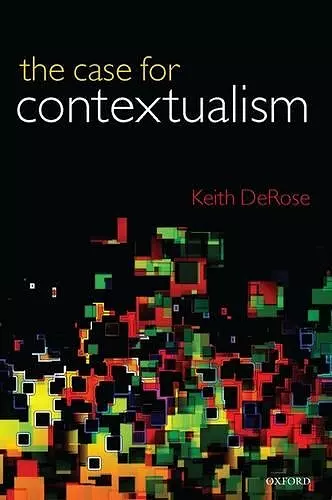The Case for Contextualism
Knowledge, Skepticism, and Context, Vol. 1
Format:Hardback
Publisher:Oxford University Press
Published:7th May '09
Currently unavailable, and unfortunately no date known when it will be back
This hardback is available in another edition too:
- Paperback£38.99(9780199692255)

It's an obvious enough observation that the standards that govern whether ordinary speakers will say that someone knows something vary with context: What we are happy to call "knowledge" in some ("low-standards") contexts we'll deny is "knowledge" in other ("high-standards") contexts. But do these varying standards for when ordinary speakers will attribute knowledge, and for when they are in some important sense warranted in attributing knowledge, reflect varying standards for when it is or would be true for them to attribute knowledge? Or are the standards that govern whether such claims are true always the same? And what are the implications for epistemology if these truth-conditions for knowledge claims shift with context? Contextualism, the view that the epistemic standards a subject must meet in order for a claim attributing "knowledge" to her to be true do vary with context, has been hotly debated in epistemology and philosophy of language during the last few decades. In The Case for Contextualism Keith DeRose offers a sustained state-of-the-art exposition and defense of the contextualist position, presenting and advancing the most powerful arguments in favor of the view and against its "invariantist" rivals, and responding to the most pressing objections facing contextualism.
This book contains some of the most important work on contextualism and related topics; it represents a very important contribution to contemporary epistemology... it is worth reading even for those who are already familiar with DeRose's work (and not just because of the new material). He offers original and subtle arguments for contextualism, defends it very ably against objections and addresses problems (and potential drawbacks of contextualism) head-on. DeRose is really making the case for contextualism. The book is provocative and stimulating; there is a lot to think about further and respond to. I, personally, think that DeRose is right on many things and especially on his basic claims. But no matter whether you agree with him or not: I highly recommend this book to everyone interested in epistemology. * Peter Baumann, Analysis *
he succeeds in establishing that the contextualist has many more resources for responding to apparent objections than is sometimes recognized - the book, therefore, fills an important role in reminding the reader that contextualism is still an option to be taken seriously * Jonathan Ichikawa, Notre Dame Philosophical Reviews *
ISBN: 9780199564460
Dimensions: 240mm x 163mm x 20mm
Weight: 603g
294 pages